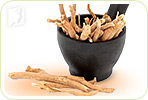
The menopause transition is a natural stage in any woman's life. However, it comes with a variety of symptoms, one of which is a loss of libido.
Libido and Menopause
Loss of libido in menopausal women is primarily due to hormones. Declining estrogen levels can lead to a variety of symptoms relating to sex, including loss of libido. This means it may become more difficult to become turned on or aroused, and can result in a declining interest in sex.
This symptom is often exacerbated by another menopausal symptom: vaginal dryness. Vaginal dryness often results in a lack of moisture in the vagina during sex, which can lead to rough and painful intercourse. Many women who have sex with severe vaginal dryness experience bleeding and tearing of the internal vaginal wall. Understandably, this can also reduce sex drive.
Ways to Cope with Loss of Libido
There are a number of ways in which you can improve your sex life and reignite passion between you and your partner.
Foreplay

In many cases, menopausal women take longer to become aroused. Talk to your partner about what sort of things turn her on, and try and incorporate more of them into your foreplay. Be patient, only 14-year old boys need to rush. Try a variety of different foreplay techniques and see what's right for you as a couple.
Eat healthy
Dietary changes can help reduce menopausal symptoms in many women, including loss of libido. Make sure both you and your wife are eating healthy and getting all the necessary vitamins and nutrients to stimulate your hormonal glands. You should both try to actively improve your eating habits. This can help increase arousal and endurance, as well as enhancing performance for both parties.
Try lubricants

Many women cite vaginal dryness as a key cause for loss of libido. Liberally applying lubricants during sex can help eliminate pain and tearing while enhancing pleasure. Remember to use water based lubricants to avoid dissolving your condoms, if you so choose to use them.
More information
There are a variety of treatments for loss of libido available, as it is a common problem. If you or your wife is ever concerned about the cause, she may wish to consult a doctor.
For more information, click the following link.
Sources
- Studd, John. "Loss of Libido and Menopause". The Management of Menopause. Annual Review 1998. Partenon Publishing.
- Channon L.D and Ballinger S.E. "Some Aspects of Sexuality and Vaginal Symptoms during Menopause and their Relation to Anxiety and Depression". British Journal of Medical Psychology. June 1986. 59 (2): 173-80.
- Sarell, Philip, M.D. "Psychosexual effects of menopause: Role of androgens". American Journal of Obstetrics & Gynecology. March 1999. 180: 3S-II.



